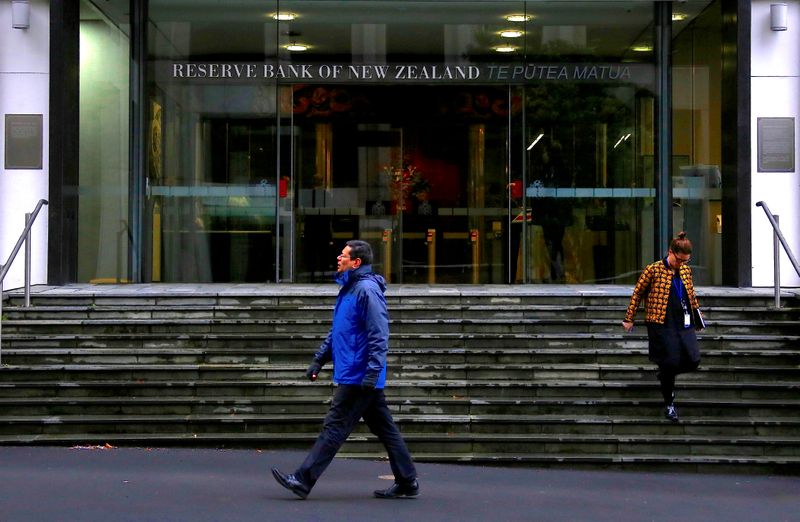
- All Instrument Types
- Indices
- Equities
- ETFs
- Funds
- Commodities
- Currencies
- Crypto
- Bonds
- Certificates
Please try another search

New Zealand raises rates for first time in seven years, more to come
 © Reuters. FILE PHOTO: Pedestrians walk near the main entrance to the Reserve Bank of New Zealand located in central Wellington, New Zealand, July 3, 2017. REUTERS/David Gray/File Photo
© Reuters. FILE PHOTO: Pedestrians walk near the main entrance to the Reserve Bank of New Zealand located in central Wellington, New Zealand, July 3, 2017. REUTERS/David Gray/File Photo
By Praveen Menon
WELLINGTON (Reuters) -New Zealand's central bank hiked interest rates on Wednesday for the first time in seven years and signalled further tightening to come, as it looks to get on top of inflationary pressures and cool a red-hot housing market.
The 25 basis point rate hike marks the start of a tightening cycle that had been expected to begin in August, but was delayed after an outbreak of the coronavirus Delta variant and a lockdown that is continuing in its biggest city Auckland.
The increase in the cash rate to 0.50% by the Reserve Bank of New Zealand (RBNZ) had been forecast by all 20 economists polled by Reuters.
The New Zealand dollar briefly rose after the announcement but fell back to $0.6930, in line with broader market moves.
"It was pretty much in line with what everyone was picking," said Jason Wong, senior market strategist at BNZ in Wellington. "We're on a path towards a series of rate hikes and the market is well priced for that."
Announcing its decision, the RBNZ said further removal of monetary policy stimulus was expected, with future moves depending on the medium-term outlook for inflation and employment.
The rate hike puts New Zealand ahead of most other developed economy nations as central banks look to wind back emergency-level borrowing costs, although countries including Norway https://www.reuters.com/world/europe/norway-raises-interest-rates-says-another-hike-likely-december-2021-09-23, the Czech Republic https://www.reuters.com/article/czech-economy-rates-idUSL8N2PC69R and South Korea https://www.reuters.com/business/finance/skorea-seen-delivering-its-first-pandemic-era-rate-hike-2021-08-25 have already raised rates.
In neighbouring Australia, the central bank held interest rates at a record low 0.1% for an 11th straight month on Tuesday.
Economists expect the benchmark rate to reach 1.50% by the end of next year and 1.75% by the end of 2023, the Reuters poll showed.
CAPACITY STRAINS
The South Pacific nation has enjoyed a rapid economic recovery since a COVID-driven recession last year, partly because it eliminated coronavirus and reopened its economy before others.
But with its borders still shut, labour and goods shortages are pushing up inflation, as well as contributing to a surging property market, which has been driven by ultra-low interest rates.
"Demand shortfalls are less of an issue than the economy hitting capacity constraints...," the RBNZ Committee noted in the minutes of the meeting.
The central bank said headline CPI inflation is expected to increase above 4% in the near-term but return towards its 2% midpoint over the medium term.
Recent COVID-19 restrictions have not materially changed the medium-term outlook for inflation and employment, and economic activity will recover quickly when the measures are eased, it added.
But economists said the RBNZ may not race ahead with its hiking cycle in view of the current global uncertainty and the Delta variant outbreak dragging on in Auckland.
"(We) remain of the view that further rate hikes will be in 25 basis point increments rather than 50 basis point moves," said Citibank economist Josh Williamson.
New Zealand abandoned its strategy of eliminating COVID-19 this week, with the government saying it will have to live with the virus and step up vaccination rates to control it.
In August, a central bank official confirmed it had also considered a 50-basis-point move that month, before taking a rate hike off the table altogether due to the lockdown.
Related Articles
Are you sure you want to block %USER_NAME%?
By doing so, you and %USER_NAME% will not be able to see any of each other's Investing.com's posts.
%USER_NAME% was successfully added to your Block List
Since you’ve just unblocked this person, you must wait 48 hours before renewing the block.
I feel that this comment is:
Thank You!
Your report has been sent to our moderators for review






Add a Comment
We encourage you to use comments to engage with other users, share your perspective and ask questions of authors and each other. However, in order to maintain the high level of discourse we’ve all come to value and expect, please keep the following criteria in mind:
Enrich the conversation, don’t trash it.
Stay focused and on track. Only post material that’s relevant to the topic being discussed.
Be respectful. Even negative opinions can be framed positively and diplomatically. Avoid profanity, slander or personal attacks directed at an author or another user. Racism, sexism and other forms of discrimination will not be tolerated.
Perpetrators of spam or abuse will be deleted from the site and prohibited from future registration at Investing.com’s discretion.